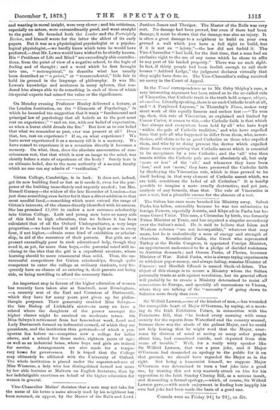Sir Wilfrid Lawson,—one of the kindest of men,—bas wounded the
susceptible heart of Major O'Gorman, by saying, at a meet- ing in the Irish Exhibition Palace, in connection with the Permissive Bill, that " he looked every morning with some
1 anxiety for the reports from Waterford and the country around, because there was the abode of the gallant Major, and he could I not help fearing that he might read that the Major, over- come by distress of mind at seeing so many sober people about him, had committed suicide, and departed from this scene of trouble." Well, for a really witty speaker like Sir Wilfrid Lawson, that was a poor joke, and if Major O'Gorman had demanded an apology to the public for it on that ground, we should have regarded the Major as in the I right. But being a humourist himself, we suppose Major O'Gorman was determined to turn a bad joke into a good one, by treating this not very masterly attack on him for his opposition to the Irish Sunday Closing Bill, as a serious insult, and demanding a formal apology,—which, of course, Sir Wilfrid Lawson gave,—with much enjoyment in finding how happily his own bad joke had been made the basis of a good one.






































 Previous page
Previous page